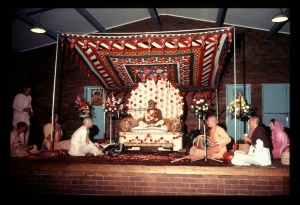SB 10.61.20: Difference between revisions
m (1 revision(s)) |
(Vanibot #0018 edit: make synonym terms in Sanskrit italic in SB - Vanisource) |
||
| Line 1: | Line 1: | ||
{{info | {{info | ||
|speaker=King | |speaker=King Parīkṣit | ||
|listener= | |listener=Śukadeva Gosvāmī | ||
}} | }} | ||
[[Category:Srimad-Bhagavatam - Canto 10 Chapter 61]] | |||
[[Category:Bhagavatam Verses Spoken by Pariksit Maharaja - Vanisource|106120]] | |||
<div style="float:left">'''[[Srimad-Bhagavatam]] - [[SB 10|Tenth Canto]] - [[SB 10.61: Lord Balarama Slays Rukmi|Chapter 61: Lord Balarāma Slays Rukmī]]'''</div> | |||
<div style="float:right">[[File:Go-previous.png|link=SB 10.61.19]] '''[[SB 10.61.19]] - [[SB 10.61.21]]''' [[File:Go-next.png|link=SB 10.61.21]]</div> | |||
{{RandomImage}} | |||
{{SBnotice}} | |||
==== TEXT 20 ==== | ==== TEXT 20 ==== | ||
<div | <div class="verse"> | ||
śrī-rājovāca | :śrī-rājovāca | ||
kathaṁ rukmy arī-putrāya | :kathaṁ rukmy arī-putrāya | ||
prādād duhitaraṁ yudhi | :prādād duhitaraṁ yudhi | ||
kṛṣṇena paribhūtas taṁ | :kṛṣṇena paribhūtas taṁ | ||
hantuṁ randhraṁ pratīkṣate | :hantuṁ randhraṁ pratīkṣate | ||
etad ākhyāhi me vidvan | :etad ākhyāhi me vidvan | ||
dviṣor vaivāhikaṁ mithaḥ | :dviṣor vaivāhikaṁ mithaḥ | ||
</div> | </div> | ||
| Line 20: | Line 25: | ||
==== SYNONYMS ==== | ==== SYNONYMS ==== | ||
<div | <div class="synonyms"> | ||
śrī-rājā | ''śrī-rājā uvāca''—the King said; ''katham''—how; ''rukmī''—Rukmī; ''ari''—of his enemy; ''putrāya''—to the son; ''prādāt''—gave; ''duhitaram''—his daughter; ''yudhi''—in battle; ''kṛṣṇena''—by Kṛṣṇa; ''paribhūtaḥ''—defeated; ''tam''—Him (Lord Kṛṣṇa); ''hantum''—to kill; ''randhram''—the opportunity; ''pratīkṣate''—he was waiting for; ''etat''—this; ''ākhyāhi''—please explain; ''me''—to me; ''vidvan''—O learned one; ''dviṣoḥ''—of the two enemies; ''vaivāhikam''—the marital arrangement; ''mithaḥ''—between them. | ||
</div> | </div> | ||
{{SBcollapse}} | |||
==== TRANSLATION ==== | ==== TRANSLATION ==== | ||
<div | <div class="translation"> | ||
King Parīkṣit said: How could Rukmī give his daughter to his enemy's son? After all, Rukmī had been defeated by Lord Kṛṣṇa in battle and was waiting for an opportunity to kill Him. Please explain this to me, O learned one—how these two inimical parties became united through marriage. | King Parīkṣit said: How could Rukmī give his daughter to his enemy's son? After all, Rukmī had been defeated by Lord Kṛṣṇa in battle and was waiting for an opportunity to kill Him. Please explain this to me, O learned one—how these two inimical parties became united through marriage. | ||
</div> | </div> | ||
__NOTOC__ | </div> | ||
</div> | |||
<div style="float:right">[[File:Go-previous.png|link=SB 10.61.19]] '''[[SB 10.61.19]] - [[SB 10.61.21]]''' [[File:Go-next.png|link=SB 10.61.21]]</div> | |||
__NOTOC__ | |||
__NOEDITSECTION__ | |||
Revision as of 17:31, 1 December 2017

A.C. Bhaktivedanta Swami Prabhupada
Please note: The synonyms, translation and purport of this verse were composed by disciples of Śrīla Prabhupāda
TEXT 20
- śrī-rājovāca
- kathaṁ rukmy arī-putrāya
- prādād duhitaraṁ yudhi
- kṛṣṇena paribhūtas taṁ
- hantuṁ randhraṁ pratīkṣate
- etad ākhyāhi me vidvan
- dviṣor vaivāhikaṁ mithaḥ
SYNONYMS
śrī-rājā uvāca—the King said; katham—how; rukmī—Rukmī; ari—of his enemy; putrāya—to the son; prādāt—gave; duhitaram—his daughter; yudhi—in battle; kṛṣṇena—by Kṛṣṇa; paribhūtaḥ—defeated; tam—Him (Lord Kṛṣṇa); hantum—to kill; randhram—the opportunity; pratīkṣate—he was waiting for; etat—this; ākhyāhi—please explain; me—to me; vidvan—O learned one; dviṣoḥ—of the two enemies; vaivāhikam—the marital arrangement; mithaḥ—between them.
Translation and purport composed by disciples of Śrīla Prabhupāda
TRANSLATION
King Parīkṣit said: How could Rukmī give his daughter to his enemy's son? After all, Rukmī had been defeated by Lord Kṛṣṇa in battle and was waiting for an opportunity to kill Him. Please explain this to me, O learned one—how these two inimical parties became united through marriage.